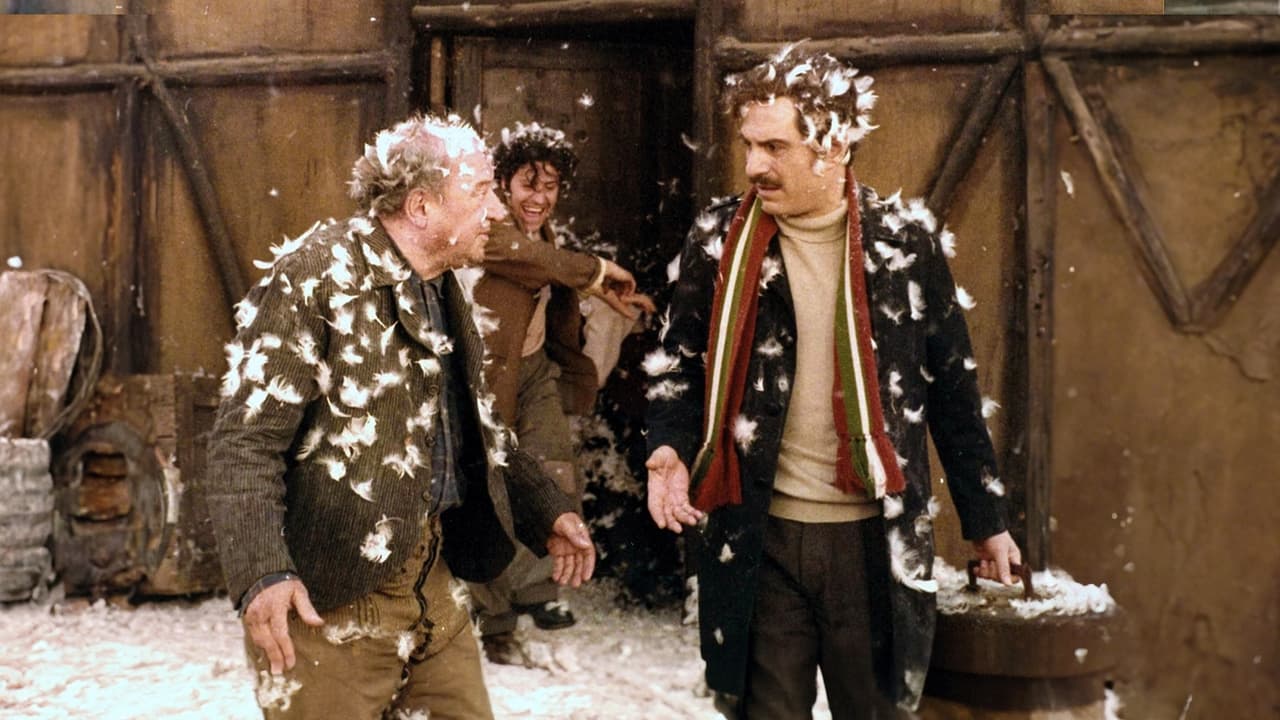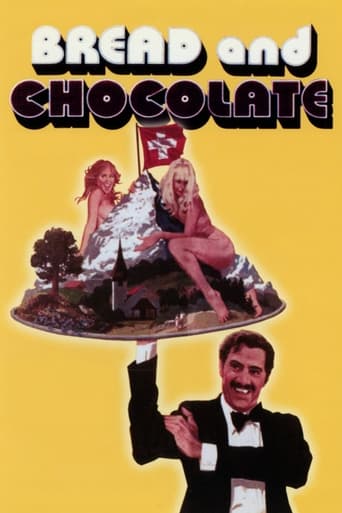

Good concept, poorly executed.
... View MoreA Masterpiece!
... View MoreThere are moments that feel comical, some horrific, and some downright inspiring but the tonal shifts hardly matter as the end results come to a film that's perfect for this time.
... View MoreStory: It's very simple but honestly that is fine.
... View MoreAlthough a bit too long,"Pane e Cioccolate" features moments of unquestionable brilliance,of sheer genius ,which make him a classic of the Italian cinema any day.The scenes in the chicken cop are terrific and include idea to rival the best of the Italian cinema of the seventies ,which is saying something.It's so terrific I have to search my memory to find such terrifying scenes as those of the poor wops turning into poultry.And as if it weren't enough,those purple passages are followed by the irruption of posh young people,rich kids,who look like E.T.s .It's Italian directors' forte to walk a fine line between comedy and drama (the drag act),a thing French movies simply can't achieve ,with a few exceptions.Much more accessible than his stodgy "disordine" ,"pane" is Brusati's (and Manfredi's ) triumph :it's updated Chaplin -the scene when the hero chews his sandwich when elegant ladies are serving cakes and enjoying classical music - An immigrant will always be "tried out" .Everywhere he shows,he will be the perfect loser .Like this? try these.....They're a weird mob (Powell,1966) America America (Kazan ,1963) The immigrant (Chaplin,1918)
... View MoreThis played at a suburban cinema in my town back in 1978 when I was in high school. Back then they were sneaking foreign films from the city into the suburbs hoping to broaden their audiences (it didn't work). I remember fighting with the ticket lady to get in. It didn't have a rating originally but the theatre gave it an R on its own. When I pointed out that that was illegal (I was bluffing--I have no idea if it was legal or not) she quickly gave me the ticket.The movie wasn't THAT bad--there's only some pretty tame female nudity here and there. As the rest of the content I have never forgotten the first scene when the main character is in a beautiful forest enjoying the sunshine and birds--and then comes upon the bloody mutilated body of a little girl. The juxtaposition of beauty and horror shocked me and that scene has never left me. That aside I found the film quite funny--I didn't try to understand what it was about. Back then I loved movies (and still do) and just saw anything I could see. The chicken coop sequence was uproarious and I found the waterfall sequence with the nude teenagers quite beautiful. I haven't seen this film since 1978 (that's when it opened in the U.S.) and I'm afraid to. I don't think it will live up to my memories. Still, if you get a chance, I do recommend this movie.
... View MoreA Film Review of Pane e Cioccolata Written By Jeremy LawrenceThe film "Pane e Cioccolata", also known as bread and chocolate (1973) directed by Franco Brusati is one of the remarkable films that installs the perception of both lifter and of sorrow. Brusati takes the audience through the life of an illiterate southern Italian immigrant as he tries to find refuge in the economic system of Switzerland in order to earn enough money to support him self and that of his so called families back home in Italia. As he progresses through the story unusual problems arise that involve differences in culture as well as a specific stereotype problems created by the society and even by himself. Threw out the film Nino (Nino Manfredi) is thrown into situations that arise because of his lack of a formal education and of his difference in cultural practices. For instance in a spectacular scene ware Nino is confronted by a Swiss police inspector (Giorgio Cerioni) who presents Nino with a photograph of himself urinating in public, his cultural differences are evident. But at first the inspector tells Nino that he has committed an obscene act in public. Nino is appalled by the accusation, but when the inspector tells him that the act was of him taking a pepe in public Nino is Lost and can not see why the act was so offensive that he should be fired for the act alone. What is missing is that in Nino's culture of uneducated southern Italians (hicks) the act is a trivial one and an obscene act is much more sever, infect Neno rebuttals that he has not done an obscene act in private for some time. This and a plethora go to show the distance that Nino was from the members of his surrounding communities. Finally after trying to assimilate into the Swiss culture Nino gives up and decides to change his physical appearance to better resemble the traditional blond hair. When he travels into a pup for a drink he does not know how to answer the water. When a soccer game between the Italian team and the Swedish team appears on the television Nino tries to hide his indignation of the Swiss towards himself and root for the Swiss team. To all that are in the pup the fact that Nino is not a Native German speaker is in explicitly evident. He is ultimately rejected from the society and is imprisoned ware when he is released his blond hair was cut off. This further goes to illustrate his lack of acceptance from the members of the Swedish society. But when her tries to return to Italy, he abandons the train and returns to Switzerland. Throughout his struggle Nino is constantly rejected and a pone boarding the train that will take him back to Italy he is reminded of the stereotypical cultural influence of the fellow train occupancy as they brake out into song. This further goes to demonstrate his unwillingness to return to the foreboding family back home and reaffirms his belief that wail he may not be educated he is at least trying to make ends meet. But one must wonder if he were smarter why did he not go to the Italian speaking part of Switzerland or after a few years why he could not speak more German than the hand full of words he admitted to know. But all in all the stories goes to show that racism and prodigies are not always the solution and that wail one may be illiterate that the circumstances that perspired against that person may or may not lead that individual full circle. This film has much more to say and I, the writer do not have the space to elaborate. For example there is the social implications of the forged friendship of the Italian Industrialist and Nino. But for all purposes this film encourages those who take the time to watch the film to engulfed ourselves in Nino's struggles and to relate to Nino's desperation and a lack of social mannerism and lack of cultural adaptability.
... View MoreBread and Chocolate is a very humanistic movie that mixes funny with sadness. The way the Brusati shows us the way foreign people are welcome to Switzerland is somehow not the saddest way but in addition it has some humor. This makes the audience, like people said before, cry and laugh at the same time. It can also be based on a real person and not fictitious as people like Nino would do anything to stay in a country where they have opportunities. Excellent job for Brusati, it is the first Brusati film I have seen and I am looking forward to see another one.
... View More